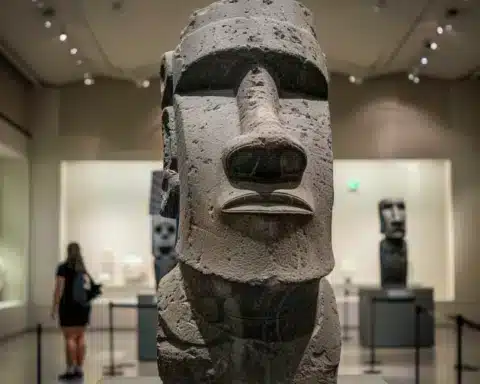The esteemed British Museum is currently in the process of reclaiming items that were illicitly removed and subsequently sold online, according to its chair, George Osborne, who addressed the matter this past Saturday.
This comes in light of recent disclosures indicating the museum’s oversight in addressing early warnings about potential sales of its items online.
The actual scale of the theft had been ambiguous. The museum had initially described the majority of the missing items as “minor artifacts stored within a particular collection.” These artifacts range from gold jewelry and semi-precious gemstones to glass artifacts spanning from the 15th century BC to the 19th century AD. Notably, none of these were displayed to the public recently.
Speaking to BBC Radio 4’s “Today” program, the ex-UK Chancellor of the Exchequer, Osborne, revealed that an estimated 2,000 artifacts had been lost, with some already reclaimed.
“There are many honest individuals who would willingly return stolen pieces, though some might not,” commented Osborne.
This ordeal can be traced back to 2021 when a Danish art dealer alerted the British Museum about spotting potential items from its collection available for purchase online. While the museum had professed to conduct a meticulous inquiry initially, Osborne mentioned a subsequent investigation deemed the initial efforts inadequate.
“It’s clear that we need to bolster our security measures,” remarked Osborne.
The British Museum, established in 1753, stands as a beacon among global museums. Housing iconic pieces such as the Rosetta Stone and the Parthenon Sculptures attract many international visitors.
The recent controversy has cast a shadow over the museum’s reputation, particularly when factoring in its controversial history of possessing artifacts acquired during the era of the British Empire.
Amidst the unfolding events, Museum director Hartwig Fischer resigned last Friday, and an anonymous staff member was dismissed on Wednesday.
Osborne stated, “We acknowledge our lapses, have offered our apologies, and are taking strides to amend these oversights. Our aim is to ensure that the British Museum remains a source of pride for both the UK and the global community.”
The hope is that the ongoing police investigation might provide insights into overlooked warnings.
While it might seem intuitive to publicize a list of the stolen artifacts, Osborne voiced concerns regarding the potential misuse of such information. He also clarified that it’s primarily the police’s responsibility to release this data.
A significant obstacle in the recovery process is the museum’s incomplete cataloging. Post-incident, there’s a renewed focus on comprehensive cataloging of all museum holdings.
Osborne concluded, “We indeed lacked a full catalogue, and given the ongoing investigation, I must be cautious with my remarks. But it’s evident that those aware of uncatalogued items would have had an unfair advantage in illicitly removing them.”
The British Museum, a symbol of global heritage and history, now faces a significant challenge in regaining not only its stolen artifacts but also the trust of the international community. As efforts to retrieve the missing items intensify, it is hoped that this incident will catalyze a more transparent and accountable era for one of the world’s most prestigious institutions.




